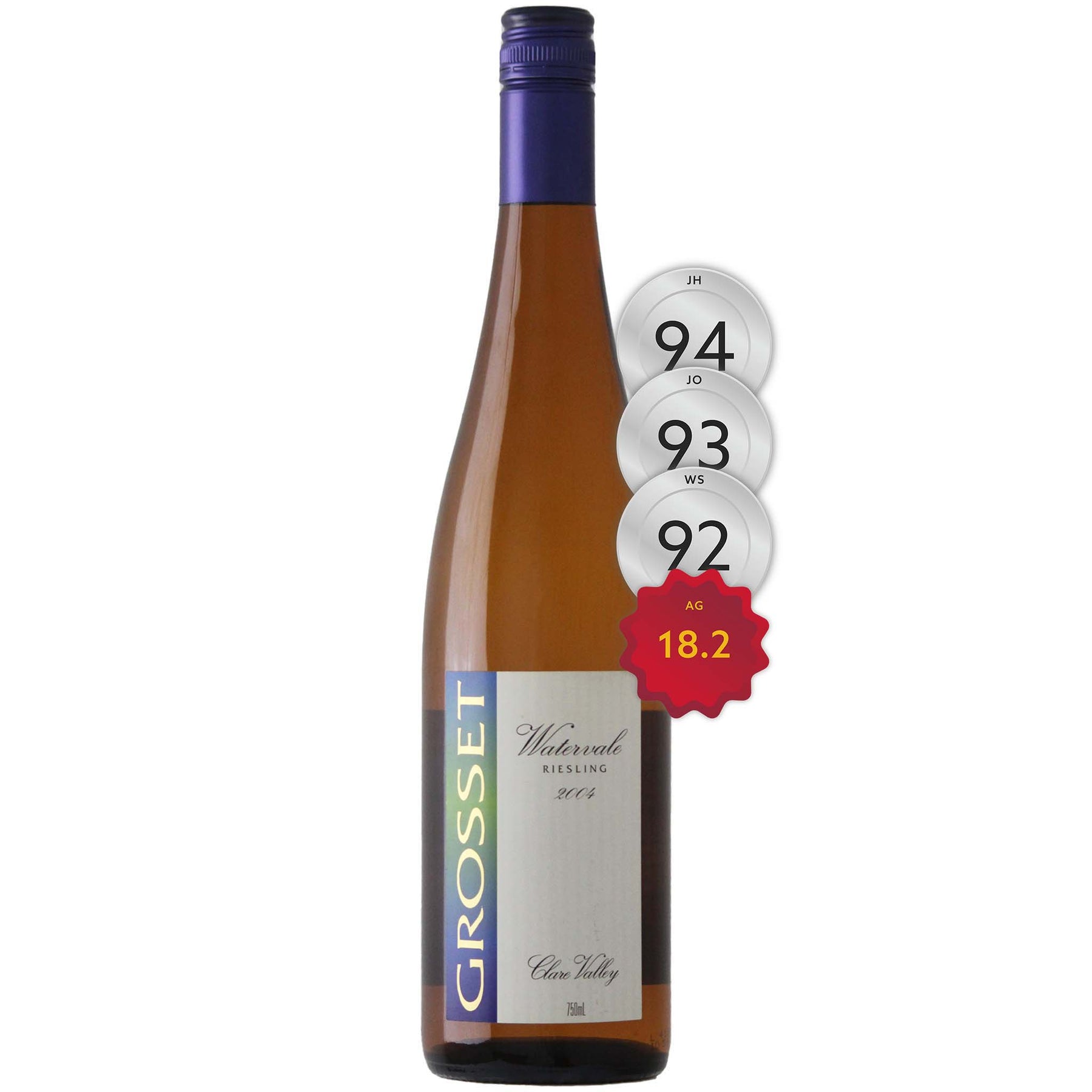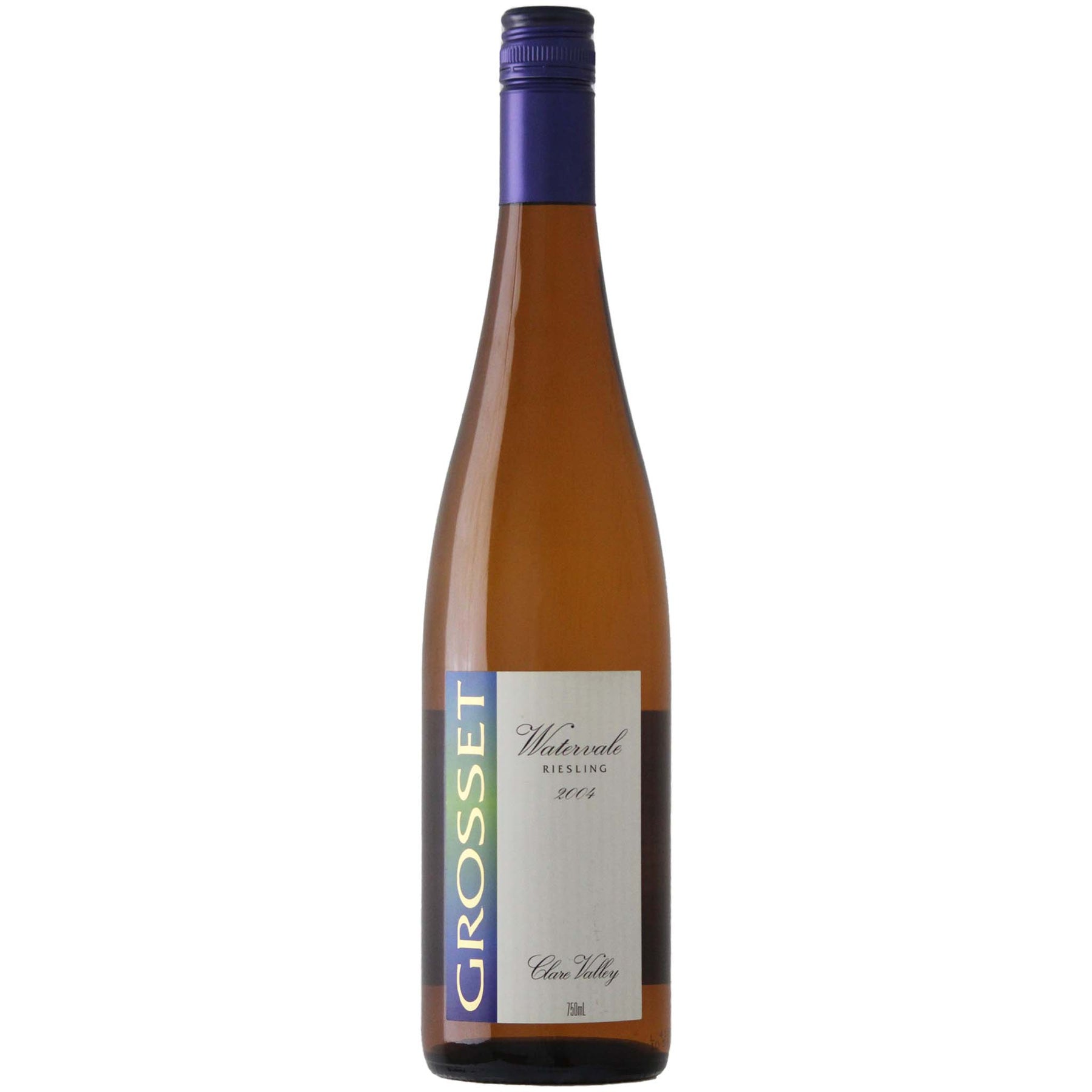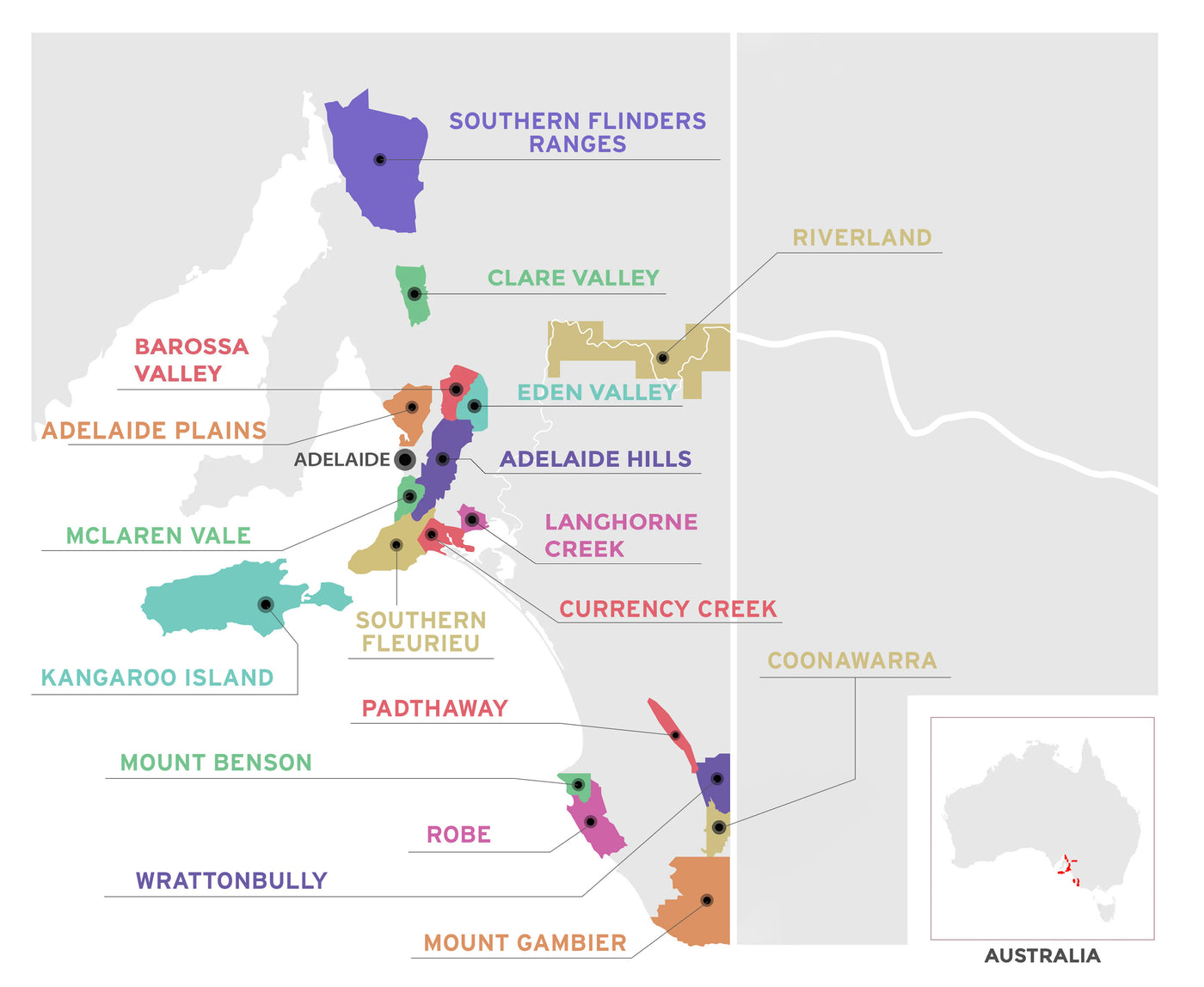

Grosset Springvale Watervale Riesling 2004
Style: White Wine
Variety: Riesling
Closure: Screwcap
Grosset Springvale Watervale Riesling 2004
Warehouse
34 Redland Drive
Vermont VIC 3133
Australia
Critic Score: 94 and 18/20
Alcohol: 13.0%
Size: 750 ml
Drink by: Now
The Grosset Springvale Riesling may sit somewhat in the shadow of its Polish Hill sibling but it is in its own right one of the benchmark rieslings of the Clare Valley. It is renowned for its aromatic complexity, pure fruit flavours and mouth-watering slatey acidity. The wine is fresh and mineral, typified by lemon curd, lime and chamomile aromas and generous flavours. A classic acid cut runs through the core, providing superb line and mineral length. The first vintage of the Grosset Springvale Riesling was produced in 1981.
"I feel so much better when a wine like this pops up in a blind tasting of about 20 rieslings – I commandeered it later to enjoy with dinner. This Watervale is all class – starting with a delicate bouquet of rose, citrus and some spice notes. It's ultra fresh and zingy in the mouth, steely but certainly not austere. A beautifully balanced wine." Jane Faulkner
"The 2004 Grosset Watervale Riesling has fragrant lemon zest and lime juice aromas, is intense, fine and powerful with rich and concentrated lime citrus flavours and a lingering, dry finish of considerable length. It is a vibrant wine with characteristic juiciness yet has a mid-palate softness which makes it approachable when young. The firm acidity indicates it will improve with age, at least in the medium term." Grosset
Expert reviews
"Light gren-yellow; spotlessly clean; classic Clare with great finesse and length; lime/tropical fruit; balanced acidity. Drink Now-2014." James Halliday, Halliday Wine Companion - 94 points
"Yellow straw in colour its very bright and vibrant in colour. The nose is characteristically limey, overlaid with toasty, honeycomb like development. No turpine on this nose which leans more towards golden toastiness, complementing the lime perfectly. The palate is quite soft on entry & very long, with layers of flavour that switch between lime/lemon fruit, then rich development, before finishing with brisk acidity. The fruit comes in on a concentrated wave of sweet lime juice, that finishes with a lingering aftertaste of citrussy grape skins.
It's a lovely, softer styled Riesling, with attractive layers of fruit & an impressive dry finish. Developing well, though I can foresee it largely just softening more from here. The only thing lacking is the sheer intensity that marks the finest vintages of Mr Grosset's Rieslings." Andrew Graham – 18.2/20 points
"Punchy floral aromas of lime juice and minerals, with perfumed, musky and lightly tropical undertones. Racy and assertive, up-front and concentrated, it's unusually luscious and thickly coated, becoming almost syrupy before its profound cut of mineral acidity. Lacking the length of fruit for greatness, but hardly short of flavour and presence. Drink 2009-2012+." Jeremy Oliver - 93 points
"I feel so much better when a wine like this pops up in a blind tasting of about 20 rieslings – I commandeered it later to enjoy with dinner. This Watervale is all class – starting with a delicate bouquet of rose, citrus and some spice notes. It's ultra fresh and zingy in the mouth, steely but certainly not austere. A beautifully balanced wine." Jane Faulkner, The Age
"Stern, bordering on tart, with pronounced stony, slightly earthy mineral flavours that weave through the lime and nectarine fruit, lingering attractively on the vibrant finish. Best from 2007 through 2015." Harvey Steiman, Wine Spectator - 92 points
Springvale vineyard
The Grosset Springvale Vineyard is a six‑hectare, organically certified vineyard situated off Springvale Road in the Clare Valley. It is a hilltop site at one of Watervale's highest elevations (460 metres above sea level), with high exposure to sunlight. The vineyard is part of a much larger property at Watervale, however, the balance of the property is being progressively returned to native vegetation as greater species diversity facilitates natural pest and disease management.
The vineyard is relatively close-planted at 2,500 vines per hectare and produces an average of just two-and-a-half bottles of wine per vine. The vineyard comprises three clones of Riesling, Clone GM110 (tight bunches, floral, Germanic and spiced), Clone 156 (rare clone from Jesuit inspiration, loose bunch, mellow, spiced, limes, steely) and Clone GM198 (most commonly used in Australia; spiced, luscious, generous). The sturdy and resilient vines produce compact yellow-green bunches of moderate sized berries.
The Springvale Vineyard is a unique viticultural site due to its geology, relative isolation and high altitude. The thin topsoils are red loams interspersed with shale over limestone and, atypical for this sub-region, the vines are deeply rooted into slate bedrock. This formation dates back many hundred million years. There is a north-south fault line on the eastern border that limits the vineyard's expansion.
The cool-fermented Grosset Springvale Riesling is renowned for its aromatic complexity, pure fruit flavours and mouth-watering slatey acidity. The wine is fresh and mineral, typified by lemon curd, lime and chamomile aromas and generous flavours. A classic acid cut runs through the core, providing superb line and mineral length.

The four Grosset estate-owned vineyards
About Jeffrey Grosset

"Jeffrey Grosset wears the unchallenged mantle of Australia's foremost riesling maker. Grosset's pre-eminence is recognised both domestically and internationally." James Halliday
Grosset was 15 when his father, an electrician, came home with a bottle of wine and shared it with the family. It was riesling and Jeffrey was gobsmacked. So began the Grosset story. The following year Jeffrey enrolled at Roseworthy Agricultural College, completing an Agriculture degree in 1973 and an Oenology degree in 1975. At the age of 21 Jeffrey started work at Seppelt Great Western, before heading to a German winery with a 1000-tonne crush as assistant winemaker, only to find the chosen French winemaker had changed his mind, leaving Grosset in charge. He subsequently returned to Australia and worked at Lindeman's Karadoc winery with its 30,000-tonne crush. But ultimately he wanted to start his own label.
In 1981 Jeffrey purchased an old milk depot in the historic township of Auburn 1981 and established Grosset Wines. He produced four wines that vintage under his own label, 800 dozen bottles in total. Now, 42 years later, Grosset is regarded as arguably the best maker of riesling in Australia and produces nine wines and 11,000 bottles per vintage.
Grosset is not shy about challenging tradition and questioning accepted practices. In the late 1980s, he was the leader of a successful movement to only allow the use of the word Riesling on Australian wines that were made specifically from the Riesling grape. Until that point, a significant number of Australian wines with Riesling on their label were made from other grape varieties.
Grosset was also the driving force behind a decision in 2000 by Clare Valley Riesling producers to switch to screwcap closures for their wines and to encourage Australian and New Zealand winemakers to do the same, and for the public, retailers and media to embrace the change. He continues to privately fund research into the subject.
Next, he established the Grosset Gaia Fund, donating to charities supporting youth, the arts and the environment. Recently he has led the way for Australian winemakers to use blockchain technology for verification of product provenance, authenticity and seal integrity.
Jeffrey Grosset has received a great deal of local and international recognition for his winemaking. In 1998, he was the first recipient of "Australian Winemaker of the Year" from Gourmet Traveller Wine magazine and was named the "International Riesling Winemaker of the Year" at the Riesling Summit in Hamburg, Germany. He was nominated in 2005 as one of the world's "50 Most Influential Winemakers" by Wine & Spirits and in 2006, named as one of the "Top 10 White Winemakers" in the world by Decanter magazine.
Grosset's philosophy has remained steadfast over the years, the emphasis is on purity of fruit. The estate vineyards, which are ACO certified organic, are hand-tended and each bunch of grapes is harvested at optimum ripeness. The winemaking process is gentle and uncomplicated. With dedication, discipline and the application of knowledge garnered through decades of experience, the result is the finest expression of variety and place.

South Australia
South Australian is responsible for more than half the production of all Australian wine. It is home to more than 900 wineries across 18 wine regions. The regions are Adelaide Hills, Adelaide Plains, Barossa Valley, Clare Valley, Coonawarra, Currency Creek, Eden Valley, Kangaroo Island, Langhorne Creek, McLaren Vale, Mount Benson, Mount Gambier, Padthaway, Riverland, Robe, Southern Fleurieu, Southern Flinders Ranges and Wrattonbully.
Many of the well-known names in the South Australian wine industry established their first vineyards in the late 1830s and early 1840s. The first vines in McLaren Vale were planted at Reynella in 1839 and Penfold's established Magill Estate on the outskirts of Adelaide in 1844.
South Australia has a vast diversity in geography and climate which allows the State to be able to produce a range of grape varieties - from cool climate Riesling in the Clare and Eden Vallies to the big, full bodied Shiraz wines of the Barossa Valley and McLaren Vale. Two of Australia's best-known wines, Penfolds Grange and Henschke Hill of Grace, are produced here. There is much to discover in South Australia for the wine lover.


